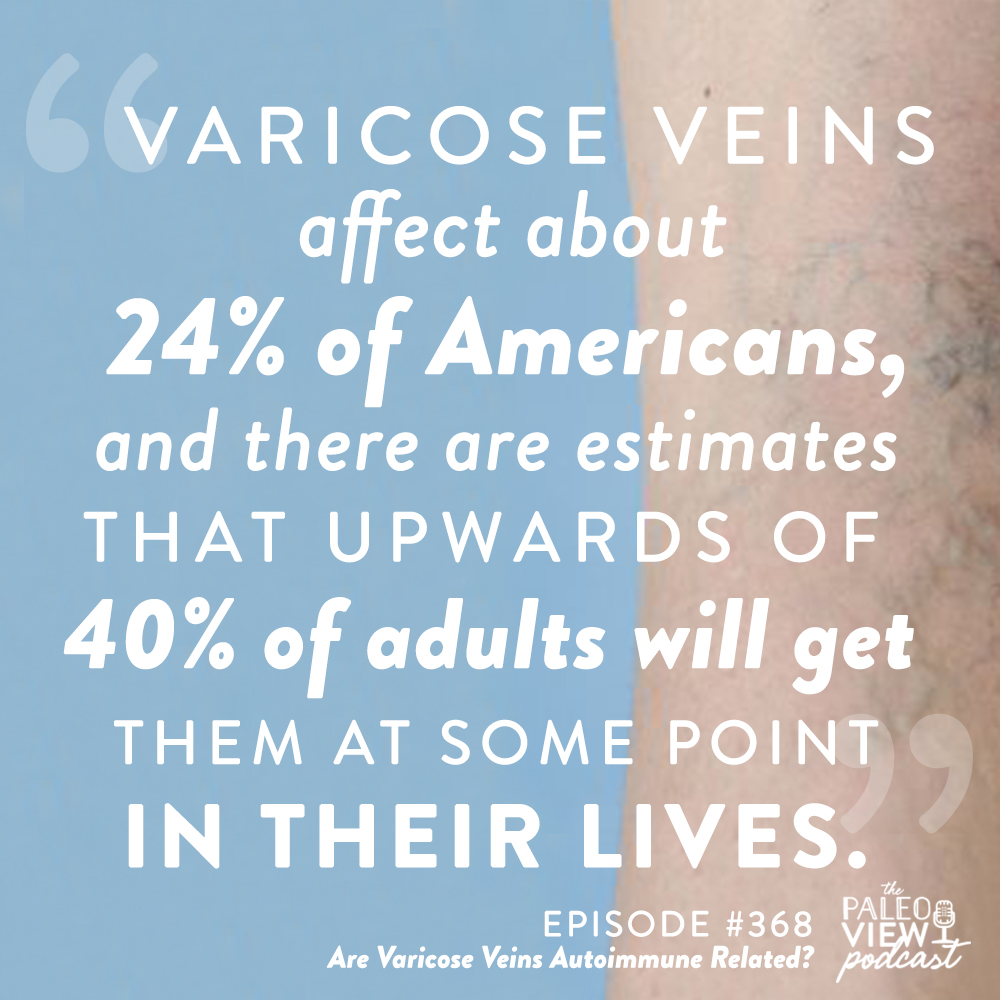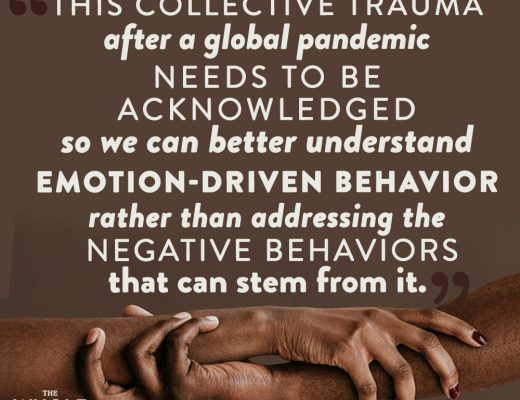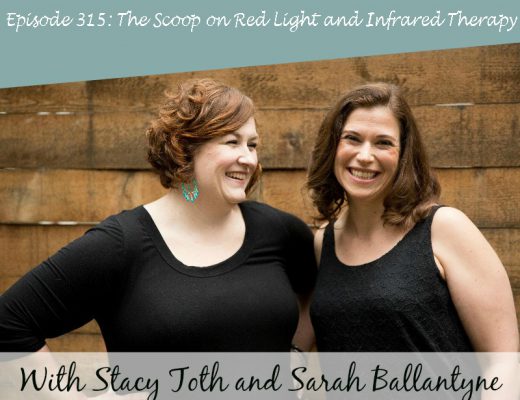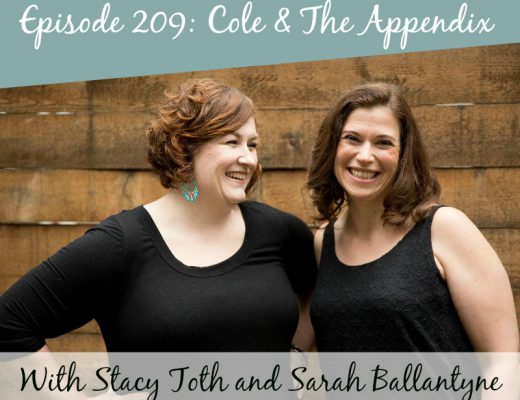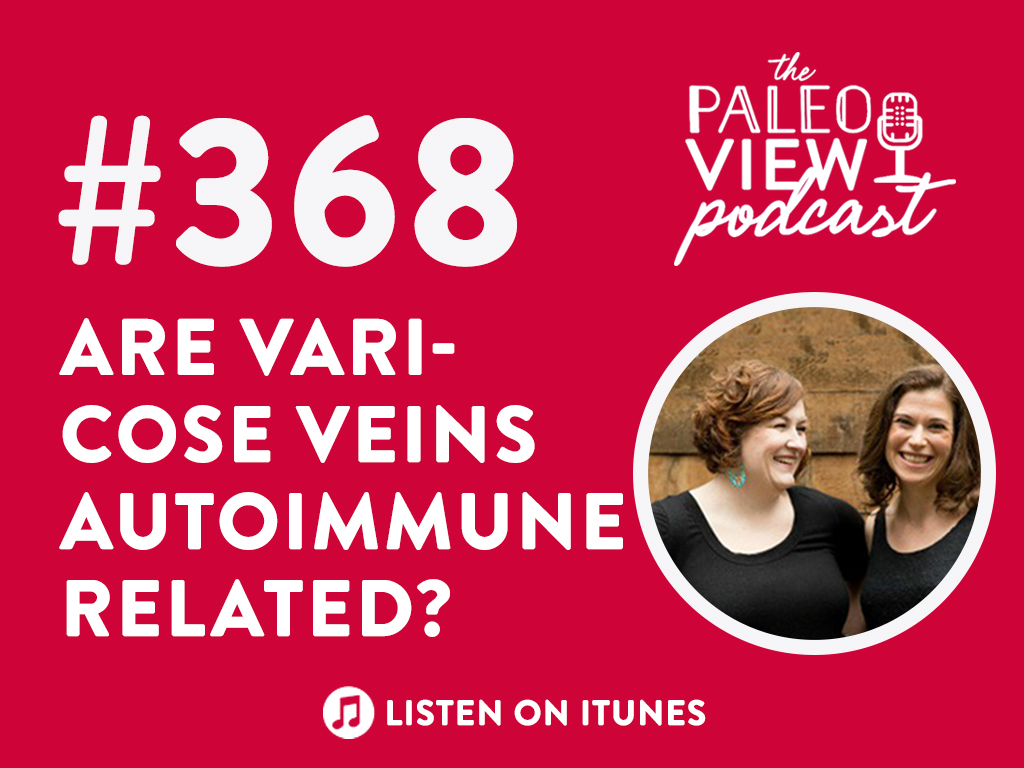
On this week’s episode, Stacy and Sarah answer a listener’s question about varicose veins. Tune in below to learn about the cause of varicose veins, how to prevent them, and how to treat them if you already have them. Enjoy!
If you enjoy the show, please review it on iTunes!
The Paleo View (TPV), Episode 368: Are varicose veins autoimmune related?
-
-
(0:40) Welcome
- Welcome back to the Paleo View listeners!
- Episode 368!
- Not 369, even though episode 368 was already recorded, but with a tech glitch
- Stacy and Sarah hope you enjoy the benefit of them already practicing this show one time through
- Special thank you to this week’s sponsor, Joovv
- A speaker reached out with a question about his Joovv:
- Lorenzo has the Quad Joovv and there is a little bit of a gap between where his Joovv pieces connect. Should he stand still or move side to side for max benefits?
- Sarah shared details on the design of the Quad Joovv and the way it is designed to be full-body
- Sarah has this model as well and what she does is move a little left to right
- Ideally, you should be standing about one to two inches away
- Sarah does 10 minutes facing her Joovv and 10 minutes with her back to it
- Stacy does a little bit longer with her back to the Joovv as she finds that it helps with her injury and joint pain
- Lorenzo has the Quad Joovv and there is a little bit of a gap between where his Joovv pieces connect. Should he stand still or move side to side for max benefits?
- Stacy and Sarah both love their Joovvs and you can learn all about them by visiting this link: https://joovv.com/paleoview
- Sarah shared information on a recent study that Joovv shared on how it impacts sleep hygiene
- Sarah uses her Joovv before bed for these reasons, and it is a natural part of her evening routine
- Stacy uses her Joovv first thing in the morning
- A speaker reached out with a question about his Joovv:
- Stacy is looking forward to being a student on this week’s podcast recording, as she knows nothing about varicose veins
- Sarah is bringing both personal experience and science to this week’s episode
- Welcome back to the Paleo View listeners!
-
(15:05) Q & A
- From Christine:
- Before I get to my question, I want to thank you for all that you do, Sarah and Stacy.
- I especially love your podcasts! I will admit, I am digging into your podcast archives, so don’t judge me.
- I listen to them while I log core at work, enabling me to be doubly nerdy!
- As a fellow scientist, I appreciate your no-none-sense approach to tackling questions and information with science.
- Even my husband (who is a chemist) loves how informative and science-based your podcasts are! Ahem, I curate select episodes for him, as it has helped him immensely in understanding AIP and profoundly improved our marriage.
- The information and advice you provide, has empowered me to ask the right questions and find the right medical providers.
- Prior to finding your websites and podcasts, I sought medical treatment from a primary care physician.
- I remember the last time I saw him: I was sitting in his office, feeling horrible after eating lunch, asking him to test me for Celiac Disease.
- I started explaining my symptoms, then he proceeded to tell me that I didn’t have Celiac Disease because I didn’t have diarrhea (sorry Stacy).
- When I explained that another symptom, infertility, was an issue, as my husband and I had been trying to conceive for 4 years without any success whatsoever; he told me, “Sometimes, it’s just not in God’s plans.”
- I swallowed my tears and persisted. Finally, he conceded after I told him that my family has a history of Celiac Disease.
- The two of you have made me feel empowered enough so that I moved on from that physician and found the right one for me.
- I feel like I can intelligently speak to my provider and be my own advocate. I am so deeply grateful.
- Now for my question… I have been making leaps and bounds on AIP over the last couple of months, after being treated for SIBO and supplementing my meals with HCl.
- I noticed for the first time in my life that my skin became soft and my nails also soft and lustrous… but, what really surprised me the most was that my varicose veins have almost disappeared.
- I’ve had them on both of my calves for about 15 years and thought that I was stuck with them for life. I was so self-conscious of them, that I rarely wore shorts or shorter dresses in public, or if I did, I wore tights or pantyhose.
- This has led me to wonder… What causes varicose veins?
- How are they autoimmune-related?
- Are they specific to certain autoimmune diseases?
- What can I do (from a diet standpoint) to keep promoting the elimination of the varicose veins?
- I love that AIP has opened so many doors to good health for me and so many others.
- AIP has helped me feel confident and beautiful again…something I thought never possible. I am so deeply grateful for what you have given me.
- Before I get to my question, I want to thank you for all that you do, Sarah and Stacy.
- Stacy wants to pause to say how mad she is at that doctor and how proud she is of Christine
- She is so proud that Christine was empowered and is giving her long-distance fist bumps
- Sarah is sending all the high fives
- Stacy wants to be friends with Christine
- Varicose veins affect about 24% of Americans, and there are estimates that upwards of 40% of adults will get them at some point in their lives
- Unless you are one of these adults, you don’t typically hear about varicose veins in the national health conversations
- This is because they are considered relatively benign
- Varicose veins are a vein where the walls have gotten weak and essentially collapsed on itself
- Because it collapsed it gets twisty
- It creates spots where blood can either backflow or pool
- Veins have valves in them that stop blood from flowing backward in between heartbeats
- Because of the weakening of the wall in the vein, the vein will kind of expand
- This then pulls the valves apart and the valves end up failing which is how you get this backflow or blood pooling
- Most of the time they are asymptomatic
- They have this characteristic dark blue or purple appearance and they can bulge out
- They don’t often feel like anything – they are typically just there
- They can be very uncomfortable
- They can ache, feel heavy, cause muscle cramps, itchy, burning, throbbing sensation, the skin around them can be irritated
- Overall they are benign, but there is this extreme symptom version of them
- When people start feeling these symptoms, this is typically when they will get varicose veins treated
- Having varicose veins does slightly increase the risk of blood clotting
- It is called thrombophlebitis
- These are big problems and require immediate medical intervention
- It is a small fraction of the people with varicose veins that have this complication
- Causes of varicose veins
- It is not super well understood
- There is a fair amount of research being done of them, but it is from the angle of how to treat varicose veins
- There are little bits and pieces to the puzzle that have been figured out:
- The weakening of the vein wall might be due to changes in collagen or elastin
- There is some kind of chronic inflammation type part of the recipe for making varicose veins
- There are other possible scenarios:
- Ex: the blood clot coming first that then causes the varicose vein
- Physical trauma can also cause them
- There is also a familial link
- However, no genes have been identified, but it does tend to run in families
- Other risk factors are:
- age
- being a woman
- being obese
- sitting or standing for too long
- having high blood pressure
- pregnancy
- Sarah first developed varicose veins during her pregnancy
- It all boils down to things that are more likely to make the vein varicose
- From Christine:
-
(26:01) The Role That Diet & Lifestyle Plays
- There is no known link between varicose veins and autoimmune disease
- There are a couple of autoimmune diseases that affect connective tissue, which has an increased risk of varicose veins
- But they are not linked to autoimmune disease in general
- It is such a high-frequency condition that it is really hard to make a link to other chronic diseases
- The statistics show that basically varicose veins are its own vascular disease
- Inflammation may be part of it, but there is no autoimmune component to it
- The statistics show that basically varicose veins are its own vascular disease
- It is interesting to Stacy that varicose veins do have an inflammation component to it, and that going to an autoimmune protocol reduces inflammation
- Sarah noted that the autoimmune protocol is designed to help the immune system regulate itself
- It means that it’s applicable in more than just autoimmune disease conditions
- There are some diet links, but the science is still very preliminary
- The best understood dietary link with varicose veins is dietary fiber
- Sarah shared more on these studies and the reasoning behind their findings
- A squatty potty would be a great way to help with this scenario
- However, if you are following an AIP you are already getting a high fiber intake from your vegetable consumption
- The other nutrients linked to varicose veins:
- Vitamin D deficiency
- Supplementation seems to help them
- Folate deficiency
- Flavinoids in general
- Plant extracts have also been tested in clinical trials and have been linked to reducing varicose veins
- Vitamin D deficiency
- There are other nutrient deficiencies links that have been found, but it isn’t known if supplementation helps in these scenarios
- Not getting enough protein
- Vitamin C
- Omega 3’s
- Zinc
- The best understood dietary link with varicose veins is dietary fiber
- It doesn’t surprise Sarah that the autoimmune protocol would benefit varicose veins
- Or at least make them shrink
- There are going to be times where the damage is enough that there is no amount of good diet and awesome flavinoids that are going to reverse that
- From a stopping the progression perspective and from helping veins that still have enough structure to return to normal, that makes a lot of sense
- The other link to the autoimmune protocol that makes sense for varicose veins is to add in exercise
- There are a lot of studies showing that the more active you are the lower your risk for varicose veins
- There have been a few intervention studies that have taken people with really bad varicose veins and put them on some kind of exercise regimen
- It seems like exercises that are specifically geared at increasing leg muscle strength are particularly helpful
- Sarah explained the explanation behind this link in greater detail
- There are a lot of studies showing that the more active you are the lower your risk for varicose veins
- Stacy asked Sarah is collagen supplementation could help with varicose veins
- Sarah tried to be as thorough as possible in her research, and couldn’t find a study where collagen supplementation was actually tested
- From an intellectual perspective, it makes sense to Sarah that supplementing with collagen and making sure that you are hitting all those other nutrients that are really important for collagen formation will help
- However, she can’t point to a scientific study that says that is the case, or how much to take
- If varicose veins are the only thing you are dealing with, you probably don’t need to go full board AIP
- You can look at the nutrient density of your diet
- Address things like long periods of sedentary time
- There is very little data comparing the different types of medical interventions for varicose veins
- They are all thought to be good for a while, but the chances of another vein blowing are really high
- The treatments are not treating the root cause
- They are all thought to be good for a while, but the chances of another vein blowing are really high
- Compression stockings can help varicose veins but are working to simply keep things where they are
- Veins can still continue to varicose if you have a lot of these other risk factors
- If your legs are starting to ache your doctors will tell you to eat more fiber
- Sarah’s translation to that is to focus on the nutrient density of your diet by increasing your vegetable intake
- She would also suggest exercise and compression stalkings
- This will help some people, but will not be sufficient for others
- Sarah’s translation to that is to focus on the nutrient density of your diet by increasing your vegetable intake
- The medical treatments that are available right now are surgery, laser therapy, and Sclerotherapy
- There are a lot of options for treatment
- Sarah recommends doing your research about all the available options
- However, Christine is a wonderful testament to the power of diet and lifestyle
- Sarah definitely recommends trying some tweaks to diet and lifestyle and compression stalkings first
- There is no known link between varicose veins and autoimmune disease
-
(47:04) Closing Thoughts
- Stacy learned a lot today and thanked Sarah for her research
- Thank you, Christine, for your wonderful question!
- Please feel free to submit YOUR questions through the forms on Stacy and Sarah’s websites
- A special thank you again to this week’s sponsor, Joovv
- Check out this awesome resource by visiting this link here: https://joovv.com/paleoview
- If you enjoyed the show and know someone who can benefit from it, leave reviews and share with those you know
- Leave comments on social media as well to help Stacy and Sarah broaden their reach to get this information to as many people as possible who are looking for healthy living resources
-
